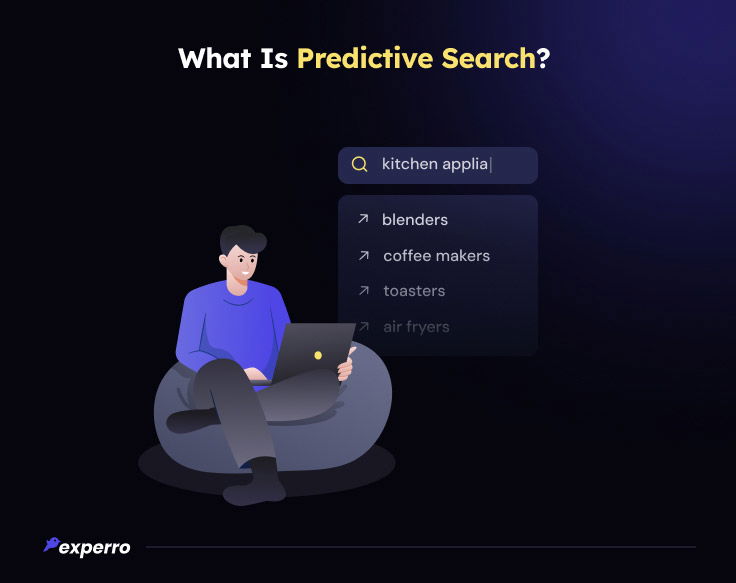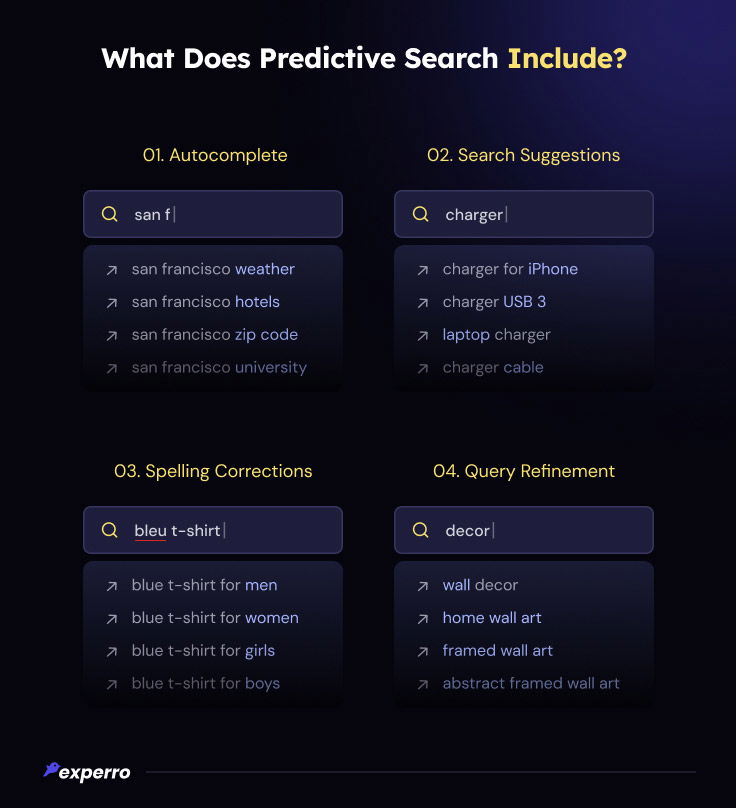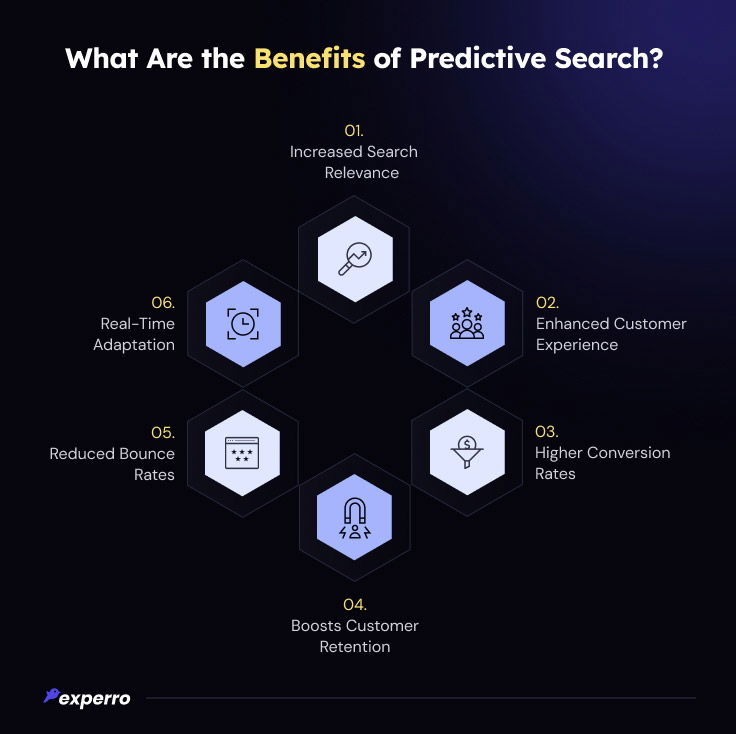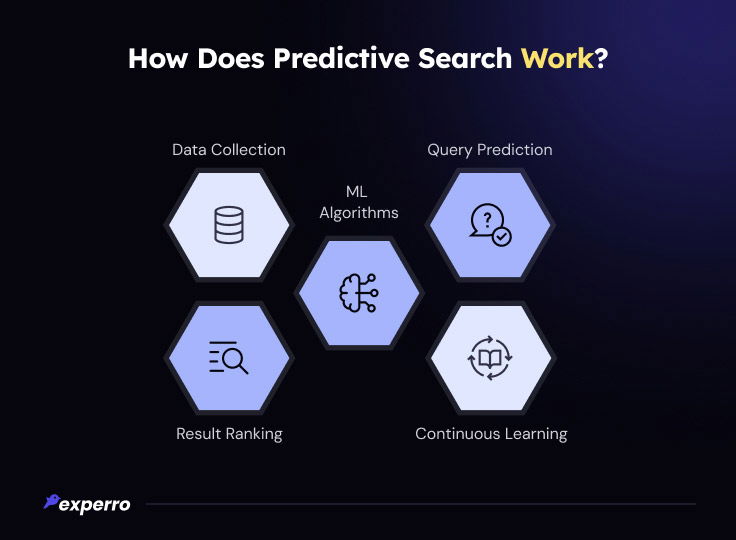How Predictive Search Elevates eCommerce Experiences?

What’s Inside
- What Is Predictive Search?
- What Does Predictive Search Include?
- What Are the Benefits of Predictive Search?
- How Does Predictive Search Work?
- Amaze Your Customers with Experro’s Predictive Search Capabilities!
- Conclusion
Key Takeaways
- Predictive search enhances user experience by offering real-time, relevant suggestions based on user behavior.
- Key features like autocomplete, search suggestions, and query refinement speed up navigation and improve content discovery.
- By reducing search time and boosting relevance, real-time query prediction can lead to higher conversion rates and increased customer retention.
- Experro’s AI-powered predictive search query functionality delivers personalized, real-time results, improving user engagement and boosting site performance.
Have you noticed how search engines anticipate your query before you even complete it?
Predictive search makes this possible.
Whether you're looking for a product or content, search prediction makes navigation seamless by offering real-time suggestions.
It’s a technology that has transformed how users interact with websites, helping them find what they need faster. But what exactly is search prediction, and how can it benefit your eCommerce site?
Let's dive into its working process and see how it can improve both user experience and conversions.
What Is Predictive Search?

Predictive search meaning – It is a search feature that uses algorithms and artificial intelligence to anticipate a user's query as they type.
Predictive customer analytics analyzes previous searches and user behavior to provide real-time suggestions, cutting down on time.
It's more than just guessing... It's about delivering relevant results that match user intent, improving both accuracy and overall predictive search UI & UX.
In eCommerce search, predictive results play a vital role in helping users find products faster, enhancing their journey through the online store.
What Does Predictive Search Include?

Below are the key components of predictive search that work together to create a seamless and intuitive user experience:
1. Autocomplete Suggestions
Autocomplete suggestions boost eCommerce sales by up to 24%, helping users find products faster and improving the overall shopping experience.
It's a staple of modern search bars, including eCommerce predictive search solutions. The predictive text search algorithm uses past searches to suggest relevant terms, making it easier for users to find what they need without typing full phrases.
Example: A user types "blue dr..." and the system suggests "blue dress", instantly narrowing down their options.
2. Search Suggestions
Search suggestions help refine search queries by offering similar or related phrases. This feature is especially useful in predictive search UX to improve content discovery.
By showing alternative search terms through personalization at scale, websites can guide users toward more accurate results and improve overall engagement.
Example: A user searching for "smartphone" might see suggestions like "smartphone deals" or "best smartphone cameras".
3. Spelling Corrections
Predictive search eCommerce also accounts for human error, offering spelling corrections to guide users toward the right results.
This feature minimizes frustration by using fuzzy search to automatically fix common typos or errors, ensuring a smooth and accurate predictive search experience.
Example: A user types "ifone" and the system corrects it to "iPhone", leading them to the correct product.
4. Query Refinement
Query refinement allows users to narrow down or expand their searchandising capabilities based on the customer's initial input.
This aspect of predictive search technology ensures users get precise results tailored to their needs, which is crucial for eCommerce websites where specific product searches are common.
Example: After searching for "men's running shoes", users can refine it to "men's waterproof running shoes" for more specific results.
What Are the Benefits of Predictive Search?

Below listed are the advantages of predictive/forecasted search:
1. Increased Search Relevance
One of the primary benefits of predictive search is delivering more relevant results. The algorithm tailors suggestions based on user behavior, ensuring the results match what users seek.
This relevance improves the overall shopping experience and leads to better content discovery.
2. Enhanced Customer Experience
Predictive search in marketing creates a smoother browsing experience with faster and more accurate results.
When users can find what they need quickly, it reduces frustration and increases satisfaction. This streamlined process can help encourage repeat visits and establish brand loyalty.
3. Higher Conversion Rates
By presenting users with relevant suggestions, predictive search results reduce the time spent searching, which can lead to faster purchasing decisions.
This direct impact on eCommerce predictive search boosts conversion rates as users are guided toward the right products with minimal effort.
4. Boosts Customer Retention
Satisfied users are more likely to revisit and purchase frequently. Predictive eCommerce search best practices help customers find what they need, building trust with the website.
By continuously offering accurate results, businesses can improve customer experience and reduce churn.
5. Reduced Bounce Rates
When users are frustrated by not finding what they need, they tend to leave. Anticipatory search minimizes this issue by providing related results upfront, leading to reduced bounce rates.
This not only keeps users on the site longer but also improves overall engagement metrics.
6. Real-Time Adaptation
Search prediction adapts in real-time to user input, offering up-to-date suggestions based on the latest trends and data.
This dynamic feature ensures that the search intelligence evolves with user behavior, keeping the site relevant and user-friendly.
How Does Predictive Search Work?

Predictive search is a system that relies on several components to function smoothly:
1. Data Collection Powers Predictive Search
The first step in real-time query prediction is gathering data from various sources like past searches, user behavior, and interactions.
This data helps inform the eCommerce search algorithms, allowing for more accurate predictions.
2. Machine Learning Algorithms Drive Accurate Predictions
Machine learning plays a crucial role in predictive search engines. These eCommerce merchandising algorithms analyze vast amounts of data to predict what users are searching for.
The algorithms are smart enough to continuously learn and improve, refining their predictions over time.
3. Query Prediction Anticipates User Intent
Once data is collected, the system predicts the user's query as they type. This step involves analyzing previous queries and applying predictive search AI to guess what the user is likely looking for.
This is key to delivering real-time multimodal search suggestions.
4. Ranking Delivers the Most Relevant Results
After predicting the query, the system ranks the most relevant results to ensure accuracy and relevance.
The predictive search engine uses various factors like keyword match, user intent, and content quality to prioritize the most appropriate results.
5. Continuous Learning Constantly Improves Predictions
Search prediction is not static—it learns from every interaction. As more users engage with the search bar UI, the system adjusts its predictions as per the natural language processing (NLP) and improves its accuracy.
AI-powered search allows a continuous learning process making predictive search solutions more effective over time.
Amaze Your Customers with Experro’s Predictive Search Capabilities!
At Experro, we offer predictive search solutions to elevate your website’s user experience. Our platform provides in-built AI-powered search with advanced algorithms to provide real-time suggestions that align with user intent.
Our predictive search allows seamless integration with any platform, ensuring your site search adapts to user behavior in real time.
Plus, our intuitive UI ensures that your search bar is not just functional but a critical part of your website's success.
With Experro, you’ll benefit from increased conversions, reduced bounce rates, and hyper-personalization that keeps potential customers connected.
Conclusion
Predictive search has become an essential tool for modern websites. Analyzing user behavior and offering real-time query suggestions enhances how visitors engage with your site.
From improving user experience to driving conversion rate optimization, the benefits of predictive search are clear.
Whether you're a large retailer or a small business, adopting this technology can significantly impact your site's performance and customer satisfaction.
It's a simple yet powerful functionality that can drive lasting success for any online platform.
For more information on enhancing real-time query prediction capabilities of your website, get in touch with our experts today!
FAQs



Pallavi Dadhich
01 October 2024Pallavi is an ambitious author known for her expertise in crafting compelling content across various domains. Beyond her professional pursuits, Pallavi is deeply passionate about continuous learning, often immersing herself in the latest industry trends. When not weaving words, she dedicates her time to mastering graphic design.